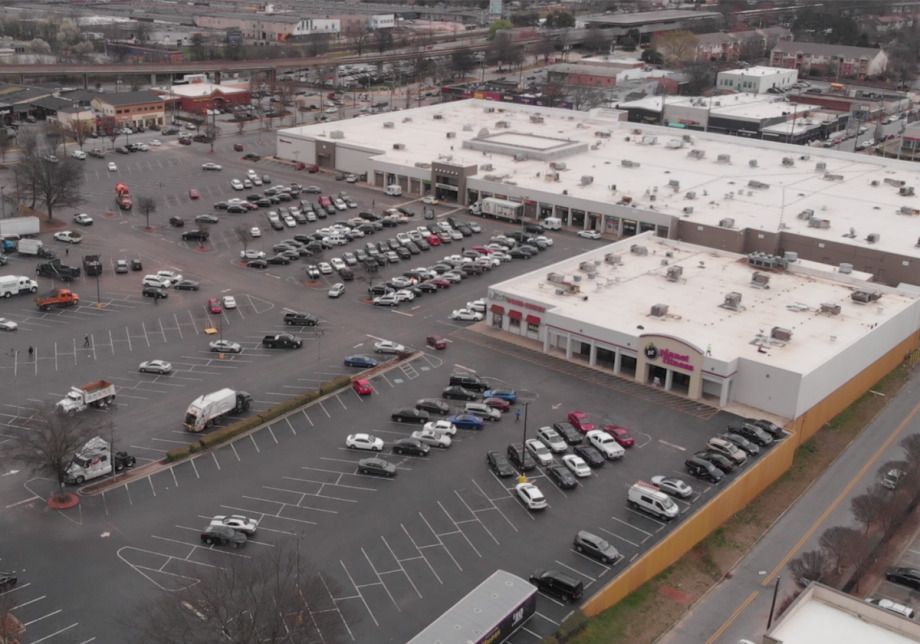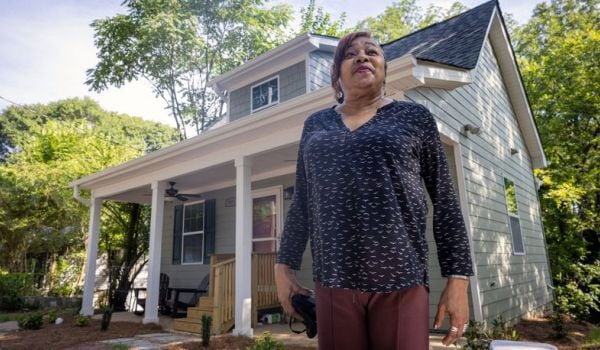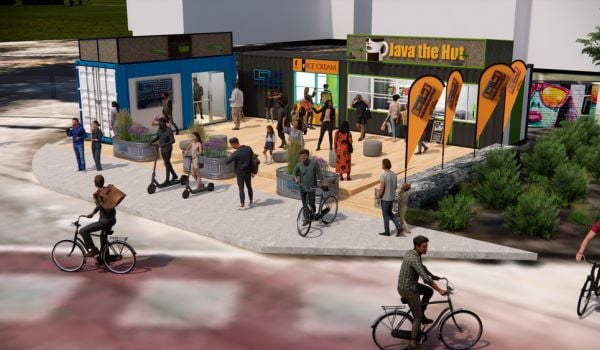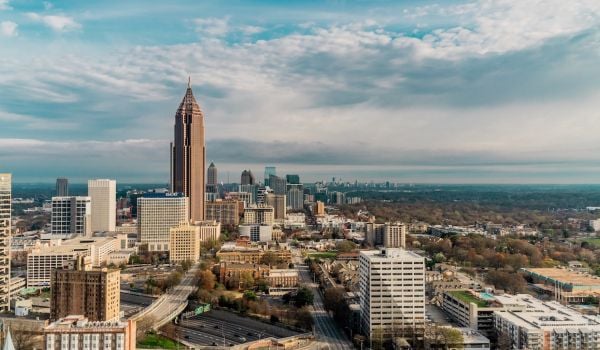When Donray Von was ten years old, his family moved from another part of Atlanta to the West End, where he began to find inspiration from seeing the best of what black communities achieved, in spite of the worst that the broader economy offered them.
“At the time the West End was becoming a middle-class black neighborhood,” Von says. “It was great to see black business owners. We lived next to doctors. I got to see the fullness of black potential when I was ten, twelve years old.”
Von’s mother worked nearby in community health, at the Morehouse School of Medicine. His late father owned an auto mechanic shop across the street from the West End Mall — where Von spent much of his teenage years.
“The mall is where I would spend my allowance, the mall is where I would buy my sneakers. The mall is where I would buy my music, where I bought my first Run-DMC cassette tapes from Peppermint Records,” Von says. “But I also look at [the mall] with tears in my eyes knowing that there are generations of broken dreams around this community.”
The neighborhood eventually came to suffer from modern-day redlining — the racist denial of home loans to black and brown households — resulting in just a 16 percent homeownership rate for the census tract around the West End Mall. With no reliable base of wealth to provide a cushion and foundation over time, the tract now has a median household income of $18,000, with a 92 percent black population. The redlining extended to business loans — Von’s father lost his business when he couldn’t get a loan to get through some hard times.
Von is now in the process of acquiring the West End Mall and working with the community to plan a $400 million, multi-year, multi-phase overhaul into a walkable mixed-use development with retail, cultural, offices, residential spaces and a hotel. His business partner on the project is Ryan Gravel, the original visionary behind the Atlanta BeltLine. While each brings key connections and expertise to the project, neither has ever led a real estate development deal before. They’re jumping off together into the deep end of the economic development pool, and they’re expecting to get a boost from Opportunity Zones — the new investor tax break intended to encourage new investment in economically distressed areas.
“The only thing I wish Opportunity Zones had was some sort of inclusion mindset like airport and state contracts have,” Von says. “Without that being mandated, we’re reverse-engineering that.”
Like earlier policies and programs, Opportunity Zones subsidize economic development in targeted geographic areas. Such programs have historically had mixed results overall. Unlike any earlier programs, the tax break only applies to capital gains income — that’s income derived from the sale of assets which have appreciated in value — which means you generally have to already be wealthy in order to use it. In 2017, just 7.3 percent of federal tax returns reported capital gains income, according to the IRS.
By default, no investor has to tell anyone but the IRS that they’re taking advantage of Opportunity Zones, since the tax break is simply deducted from capital gains income taxes and reported on individual or corporate tax returns. Many commenters raised the question of whether the IRS might exercise some discretion to require some kind of public disclosure of Opportunity Zone tax break activity or reporting on the impact of that activity. The original 2017 legislation also lacked any requirement that Opportunity Zone tax breaks create housing that is affordable for low-income households or create job opportunities for low-wage workers or business opportunities for women or entrepreneurs of color.
Even the finalized regulations around the new tax break, which the IRS and Treasury department announced December 19, do not sufficiently address advocates’ questions around public disclosure or reporting on impact.
“Even with some positive examples, you just don’t know what else is happening,” says Brett Theodos, senior fellow at the Urban Institute. “Every time people describe Opportunity Zone investment activity as slow or small, I’m just like, ‘maybe, but we don’t know what we don’t know.’”
Despite all the above, Von remains adamant that as long as the tax break exists, it’s worth the effort to bring some of the investment it generates into projects that are making open and explicit promises to benefit low-income communities, like the West End Mall.
“If you look at the history of government and high finance, those things have been relationship-based, but black and brown people are usually not in the relationship cycles,” Von says. “This is an opportunity where we can’t throw the baby out with the bathwater. Or show me the alternative and let’s get to work on that.”
Von literally took a creative path to building relationships with wealthy investors. He left Atlanta for Los Angeles in 1996, and found success on the business side of the music industry, working with acts like Outkast, Cody Chesnutt (also his cousin), The Roots, and more obscure acts — one of whom happened to be the child of a major global investment company co-founder. He got to know that family, helped them make some successful tech startup investments, and learned everything he could about wealth and managing an investment portfolio.
Most importantly, Von compiled a Rolodex of family offices — the wealth management companies and consultants who often have their clients join each other’s deals. He learned that pretty much all of them had at least some allocation of their portfolio in real estate.
Just as Von started looking into real estate investing, his father’s health started deteriorating, which brought him back to Atlanta more and more. “And if you look at Atlanta and you’re looking at real estate, you hear about the BeltLine. So I started to search for Ryan [Gravel],” Von says.
Gravel had famously resigned from the board of the Atlanta BeltLine Partnership, citing concerns shared with others that the project had drifted from the vision of inclusive and equitable development he had when he conceived of the project as a graduate school thesis.
Von and Gravel finally met on the day the latter’s mother died. It was the only business meeting Gravel took that day, on the gut feeling that his mother would have wanted him to keep the appointment.
After Von and Gravel spent about a year getting to know each other, ultimately deciding to go into business together as Elevator City Partners, Opportunity Zones came suddenly into the picture. They narrowed the search for their first project to Atlanta’s 26 Opportunity Zone census tracts, where they could feel confident that the city’s economic development arm would be helpful in putting together a project — which it has, providing a $2 million predevelopment loan to get the ball rolling on securing the site and preliminary designs. The loan comes with affordable housing set-asides for the future housing on the site.
The West End Mall was an obvious Opportunity Zone target. It’s adjacent to a mass transit station, two stops from downtown and five stops from one of the world’s busiest airports. The route of the BeltLine itself will eventually snake through the neighborhood, not far from the mall, and Atlanta’s cluster of historically black colleges and universities is just north of the area — a potential source of tenants and patrons.
With an Opportunity Zone imposed upon the neighborhood from the outside, the West End Mall was prime real estate for somebody, and there was no guarantee that somebody would have any interest in or connections to the proud heritage and present community of the West End.
“The community knows who some of the alternatives might have been at this table,” Gravel says.
After getting the site under contract, Von and Gravel have spent the past year on a preliminary site master plan and design, which led to zoning changes from the city to allow for greater height. The zoning approval meetings and hearings served as an early opportunity to start meaningfully engaging public audiences about the project — the request had to go through the neighborhood, then the zoning board, then city council. The pair hopes to continue and deepen those conversations over the next year.
Meanwhile, Von went from thumbing through his investor contact list and making calls to picking up unsolicited calls from interested investors as word got around about the project.
Von expects to raise the $400 million from multiple kinds of investors — conventional banks, other conventionally market-driven investors, as well as more philanthropic or mission-minded investors. Opportunity Zone investors will be just one of many sources of capital for the West End Mall, which isn’t that unusual for any redevelopment of this scale.
“I think there’s still some amount of over-emphasis on Opportunity Zones,” says Theodos at the Urban Institute. “They are most of the time going to be one source of capital in the capital stack. It’s never just an Opportunity Zone project, it’s also a [Low-income Housing Tax Credit] project or New Markets [tax credit] project or [tax increment financing] project or [Community Reinvestment Act] project.”
Von could not say at this point what percentage of their capital stack will actually come as a result of Opportunity Zone tax breaks.
“We’ve talked to everyone from rappers to athletes to Wall Street megabanks, and the responses we get are different,” says Von, who also moved back to Atlanta to focus on the project. “Some local rappers have no interest in the project, some of the megabanks that you think wouldn’t have an interest, if you find the right officer who’s charged with using the bank’s balance sheet to transform communities, you get a great response. I’ve learned to not judge the outcome of the meeting before the meeting happens.”
Sometimes there’s just one person on the other side of the table, Von says, but that one person is allocating for multiple pools of money with different goals for financial risk and return as well as social impact. Von makes sure that one person on the other side of the table understands the West End Mall could ultimately tap into any number of the pools they have at their disposal. But the person on the other side of the table also has to convince Von and Gravel that they share an interest in community impact and engagement.
“Large capital providers think they’re interviewing us to decide if they want to write a $400 million check,” Von says. “The truth is, we’re actually interviewing them also to understand how they feel about community.”
The most important West End community member has already weighed in with her thoughts about the potential community impact of the West End Mall redevelopment — Von’s own mother, who still lives a few blocks away from the mall.
“What my mother says to me is ‘Do what you feel is right and don’t embarrass me,’” Von says.
This article is part of The Bottom Line, a series exploring scalable solutions for problems related to affordability, inclusive economic growth and access to capital. Click here to subscribe to our Bottom Line newsletter.

Oscar is Next City's senior economic justice correspondent. He previously served as Next City’s editor from 2018-2019, and was a Next City Equitable Cities Fellow from 2015-2016. Since 2011, Oscar has covered community development finance, community banking, impact investing, economic development, housing and more for media outlets such as Shelterforce, B Magazine, Impact Alpha and Fast Company.
Follow Oscar .(JavaScript must be enabled to view this email address)


















